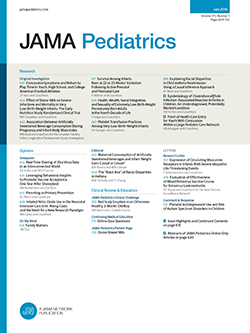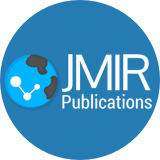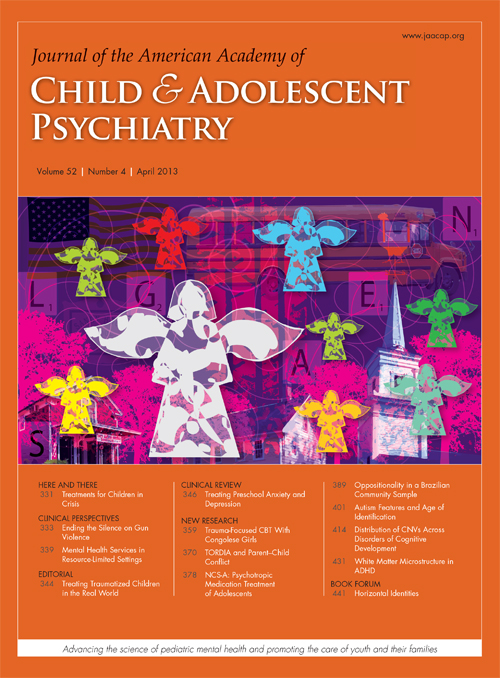301
Jan 10, 2020
Hutton JS, Dudley J,
Horowitz-Kraus T, DeWitt T, Holland SK. JAMA Pediatr. 2020;174(1):e193869.
doi:10.1001/jamapediatrics.2019.3869
This interesting study of 417
preschool children is the first to demonstrate that higher than recommended
screen time is associated with (1) lower measures of microstructural
organization and myelination of brain white matter tracts that support language
and emergent literacy skills and (2) lower corresponding cognitive assessment
results.
https://jamanetwor...
302
Jan 10, 2020
Thabrew H,
D'Silva S, Darragh M, Goldfinch M, Meads J, Goodyear-Smith F. J Med Internet
Res 2019;21(12):e13911. DOI: 10.2196/13911. PMID: 31793890. PMCID: 6918206
This New
Zealand study shows that YouthCHAT, a composite tablet-based electronic
screener is quicker to complete than face to face HEEADSSS assessment,
acceptable to students and staff and that it can identify a range of
psychosocial issues including anxiety, depression and substance use. Although further
research on its use is requ...
303
Jan 10, 2020
Tebbett-Mock,
Alison A. et al. Journal of the American Academy of Child & Adolescent
Psychiatry, Volume 59, Issue 1, 149 – 156
Although
clinicians who work in adolescent inpatient settings often utilise the principles
of dialectical behaviour therapy (DBT) to support young people, DBT itself is
usually a community treatment modality.
This US study (an RCT using a historical control) including over 400
participants found that a formal inpatient DBT programme reduced the number of
s...
304
Jan 10, 2020
Mowatt
Haugland, Bente Storm et al.Journal of the American Academy of Child &
Adolescent Psychiatry, Published online Janury 2020
This study
compared brief (5 session) and standard (10 session) school-based and anxiety focussed
cognitive behaviour therapy (CBT) with a waitlist control. The authors found that both forms of CBT were
superior to the control therapy in terms of reducing anxiety symptoms
(small-moderate effect size) and that standard CBT was better than brief CBT.
ht...
305
Jan 10, 2020
Sucksdorff,
Minna et al. Journal of the American Academy of Child & Adolescent
Psychiatry, Published online January 2020
This study of
over 1000 children found that low maternal vitamin D [25(OH)D] levels during
pregnancy were associated with an elevated risk for offspring ADHD (OR 1.65).
If replicated in independent samples, this finding may have significant public
health implications.
https://www.jaacap.org/article/S0890-8567(19)32232-4/fulltext?dgcid=raven_jbs_aip_email
306
Jan 10, 2020
Nguyen HV. JAMA Pediatr.
2020;174(1):e193912. doi:10.1001/jamapediatrics.2019.3912
Does banning substances really
work? This Canadian study found that
young people residing in states where e-cigarette use was banned were less
likely to use them and better informed about their dangers, but more likely to
source them from peers. So, additional public health measures may be needed to
truly reduce the dangers of substance use.
https://jamanetwork.com/journals/jamapediatrics/fullarticle/2...
307
Jan 10, 2020
Simonoff,
Emily et al. Journal of the American Academy of Child & Adolescent
Psychiatry, Published online January 2020
This longitudinal study found that although cognitive symptoms of autism spectrum disorder (ASD) improve between 12-23 years of age, core autism symptoms remain unchanged. It would have been interesting to know if the same were true over the earlier period of life.
https://www.jaacap.org/article/S0890-8567(19)32231-2/fulltext?dgcid=raven_jbs_aip_email
308
Jan 10, 2020
Downs SM,
Bauer NS, Saha C, Ofner S, Carroll AE. JAMA Netw Open. 2019;2(12):e1917676.
doi:10.1001/jamanetworkopen.2019.17676
This study demonstrates
the feasibility of instituting digitally-supported screening for autism spectrum
disorder (ASD) into a primary care setting.
Given that ASD can now reliably be identified during toddlerhood, this
is one way in which more routine early diagnosis and intervention may be
achieved.
https://jamanetwork.com/journals/jamanetworkopen/full...
309
Dec 18, 2019
Bethell C,
Jones J, Gombojav N, Linkenbach J, Sege R. JAMA Pediatr. 2019;173(11):e193007.
doi:https://doi.org/10.1001/jamapediatrics.2019.3007
There has
recently been a lot of discussion regarding the long-term physical and
psychological impact of adverse childhood experiences (ACEs). This study of over 6000 individuals from Wisconsin,
USA, illustrates how positive childhood experiences (PCEs) can counteract the
impact of ACEs in a dose-dependent manner.
So, regardless of a child�...
310
Dec 18, 2019
Black N,
Stockings E, Campbell G, Tran LT, Zagic D, Hall WD, Farrell M, Degenhardt L. Lancet
Psychiatry. 2019 Dec;6(12):995-1010. doi: 10.1016/S2215-0366(19)30401-8. Epub
2019 Oct 28.
Despite calls
to legalise cannabinoids for everything from the treatment of pain to cancer, this
review demonstrates that they are more likely to lead to harm than good when it
comes to the treatment of mental disorders.
There was only low quality evidence regarding their effectiveness for treating
anxiety...





